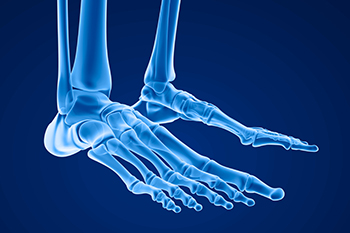The Harmony of Ankle Bones

Beneath the surface of our feet lies a delicate orchestra of bones, working seamlessly to provide stability and flexibility. The ankle bones are the unsung heroes of this intricate composition. These bones, namely the tibia, fibula, and talus, form a complex network that allows us to walk, run, and jump with precision. The tibia, the weight-bearing bone, supports our body's weight, while the fibula adds extra support and stability. The talus, perched atop the heel bone, serves as a vital link between the leg and the foot, enabling pivotal movements. These bones are finely tuned instruments, ensuring smooth walking and running on various terrains. Understanding how the bones in the ankles work together sheds light on the remarkable mechanics that keep us moving effortlessly. If you would like additional information about the various functions of the ankle bones, it is suggested that you speak with a podiatrist.
If you have any concerns about your feet, contact one of our podiatrists from InStride Family Foot Care. Our doctors can provide the care you need to keep you pain-free and on your feet.
Biomechanics in Podiatry
Podiatric biomechanics is a particular sector of specialty podiatry with licensed practitioners who are trained to diagnose and treat conditions affecting the foot, ankle and lower leg. Biomechanics deals with the forces that act against the body, causing an interference with the biological structures. It focuses on the movement of the ankle, the foot and the forces that interact with them.
A History of Biomechanics
- Biomechanics dates back to the BC era in Egypt where evidence of professional foot care has been recorded.
- In 1974, biomechanics gained a higher profile from the studies of Merton Root, who claimed that by changing or controlling the forces between the ankle and the foot, corrections or conditions could be implemented to gain strength and coordination in the area.
Modern technological improvements are based on past theories and therapeutic processes that provide a better understanding of podiatric concepts for biomechanics. Computers can provide accurate information about the forces and patterns of the feet and lower legs.
Understanding biomechanics of the feet can help improve and eliminate pain, stopping further stress to the foot.
If you have any questions please feel free to contact our offices located in Concord, Charlotte, and Salisbury, NC . We offer the newest diagnostic and treatment technologies for all your foot and ankle needs.
